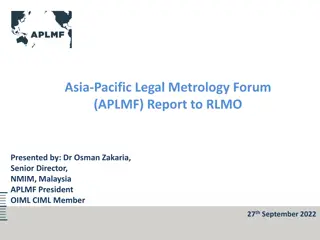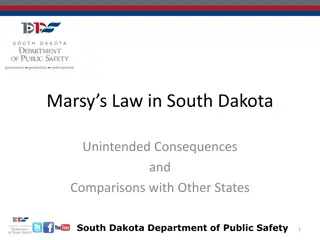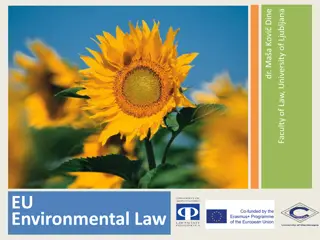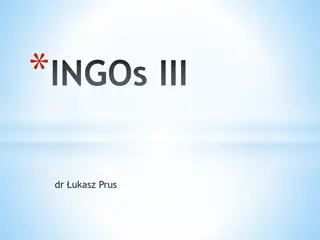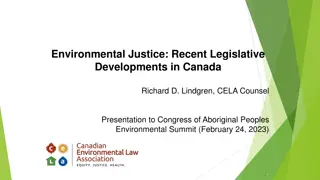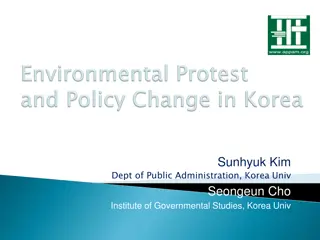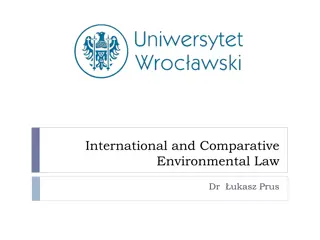Perspectives on Environmental Law in South Asia
The judiciary in South Asian countries like India, Pakistan, and Bangladesh plays a vital role in upholding environmental justice and promoting sustainable development. These judiciaries have interpreted constitutional rights to include a healthy environment, leading to landmark decisions that integrate international environmental law principles. With a focus on environmental protection and individual rights, the courts have made significant contributions to the region's environmental jurisprudence.
Download Presentation

Please find below an Image/Link to download the presentation.
The content on the website is provided AS IS for your information and personal use only. It may not be sold, licensed, or shared on other websites without obtaining consent from the author. Download presentation by click this link. If you encounter any issues during the download, it is possible that the publisher has removed the file from their server.
E N D
Presentation Transcript
Asian Perspective on Environmental Law Binod Prasad Sharma Faculty/ Judge High Court National Judicial Academy, Nepal
Background The role of the legal system to ensure environmental justice is only effective if it is universally accessible. The judiciary is also a crucial partner in promoting environmental upholding the rule of law and in ensuring a fair balance between environmental, social and developmental consideration through its judgments and declarations. Judges need to have the knowledge and tools available to pursue such noble objectives. governance,
In Asia, many higher judiciaries have interpreted as per constitutions to afford a right to a healthy environment, whether or not this is expressed. their respective Similarly, landmark decisions have introduced the principles of international environmental law from the Stockholm to Rio Declarations. South Asia region has created a new environmental jurisprudence.
The Judiciary in South Asian region has played a very environmental protection and has applied the principles of sustainable development while deciding the cases. important role in In this region specially the judiciary of India, Bangladesh, Pakistan, Sri Lanka and Nepal has played a significant role in protecting individual rights and the public interest across a range of disciplines, including environmental protection.
INDIA As a court of general jurisdiction, it has proactively interpreted the constitution s guarantee of a right to life, as including a right to a wholesome and pollution-free environment, deciding many environmental cases with unique and novel judicial innovations. It has integrated international environmental law principles in its decisions, including the precautionary principle, principle, and inter-generational equity principle. polluter pays
PAKISTAN As in other neighboring South Asian countries, environmental jurisprudence in Pakistan has been progressive. Supreme Court, initiated by taking action and suo moto; thus, case law emerged with innovative concepts being imported from international jurisprudence .
BANGLADESH Courts have interpreted the right to life under the constitution to include the right to protection and preservation of the ecology and right to have environment. a pollution-free It has liberalized standing rules and also given decisions that incorporate the international environmental law principles of sustainable development, polluter pays, and precautionary principle, within its jurisprudence.
SRI LANKA In the Environmental Foundation Limited and Others vs. the Attorney-General and Others, Court passed various orders regarding regulation and maintain pollution free to concerned authorities. Another important case, S.C. Amara Singh and three Others v. the Attorney General and three Others, Supreme Court of Sri Lanka observed the process of EIA and passed orders to regulate EIA process.
NEPAL The Supreme Court of Nepal has been entertaining environment related cases under its extra-ordinary jurisdiction, more specially, on the ground of Public Interest Litigation (PIL) under Article 133 of the constitution of Nepal (2015). There are no other effective legal measures of adjudication so far as the issues involving the question of the environment are concerned. In recent times, there are some leading environmental cases in which the Supreme Court of Nepal has invoked its extra-ordinary jurisdiction on the ground of PIL.
Other Asian countries The Judiciaries of Other Asian countries have also played a critical role in environmental enforcement by enunciating principles of environmental facilitating the development of environmental jurisprudence. law and The Supreme Court of the Philippines is institutionally committed to the protection of the environment. It considered environmental protection to be a sacred duty, due to the right to a healthy environment of both present and future generations.
CHINA The Constitution of the People s Republic of China recognizes responsibility to protect and improve the living and ecological environment, prevent and control pollution and other public hazards, and organize and encourage forest protection and afforestation. the state s The existing green courts have also resolved inland water pollution cases, the majority of which have been criminal cases.
Thailand Both the Supreme Court and the Court of Appeal have formally established environmental divisions: 1 at the Supreme Court level in 2005 and 10 at the appellate level. The jurisdiction of the green benches covers civil and criminal cases that may arise from various natural resources and pollution laws. Indonesia Environmental disputes under the Law Enforcement Act of 2009 could take three paths: administrative, criminal, or civil enforcement. Access to information and public participation, considered pillars of environmental governance, have been realized in the promulgation of a freedom of information law and freedom of the press acts which would enable civil society to participate more effectively in environmental governance.
Japan Some breakthroughs in environmental litigation The most popular one involves what has been collectively called the four great pollution lawsuits: i. Minamata Disease ii. Niigata-Minamata Disease (involving organic- mercury poisoning), iii. Itai-Itai Disease (cadmium poisoning), and iv. Yokkaichi Asthma (air pollution). cases has been taken as a
TheRepublic of Korea The Constitution of 1980 provided a right to a healthy and clean environment. This right was amended and clarified in the 1987 Constitution which provides that all citizens have a right to a healthy and pleasant environment and the substance of such right shall be determined by statutes. Malaysia Environmental jurisprudence is emergent. Court decisions have ruled that only persons who can demonstrate sufficient connection with or interest in the subject matter in dispute can seek judicial remedy.





